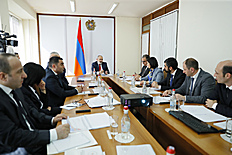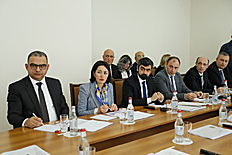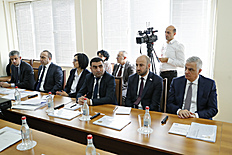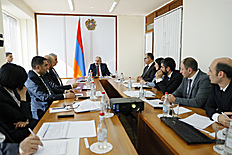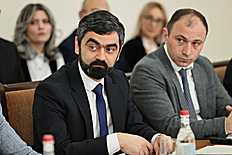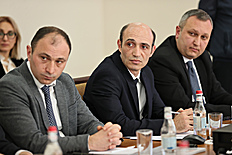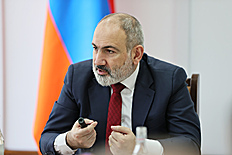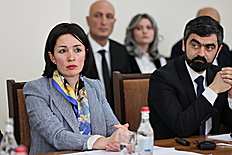Press releases
Activity report 2023 of the Higher Education and Science Committee presented to the Prime Minister
more 5 photos
Prime Minister Nikol Pashinyan visited the Higher Education and Science Committee of the Ministry of Education, Science, Culture and Sport to participate in the discussion of the activity report 2023 of the Committee.
The Chairman of the Higher Education and Science Committee, Sargis Hayotsyan, and his deputies reported on the implementation of state programs and measures for 2023 in the fields of higher education, science and scientific and technical activities within the scope of the Committee's coordination.
It was reported that the committee operating under the Ministry of Education, Science, Culture and Sport, as a new body in the state administration system, was established by the Law on making amendments to the Law on Scientific and Scientific and Technical Activities adopted on May 3, 2023, according to which the committee implements the unified policy of the field of higher education and science, uniting the functions of the Science Committee, the Higher Qualification Committee, and the Department of Higher and Postgraduate Vocational Education which previously operated under the Ministry of Education, Science, Culture and Sport.
In particular, the results of the Committee's activities in the field of science and scientific and technical activities were presented, according to the 4 pillars of the Government Action Plan for 2021-2026: re-equipment of scientific centers with modern devices and equipment and improvement of infrastructure, including through capital expenditure measures, implementation of grant programs aimed at the development of human resources and other measures, raising effectiveness of state funding, including certification of scientific personnel and gradual but significant increase in salaries as a result of the latter, regulation of the legal framework.
Prime Minister Pashinyan inquired how the Higher Education and Science Committee identifies, for example, what issues there are in the Water Resources Management Committee that can receive scientific service.
Sargis Hayotsyan noted that a directive has been sent to all departments that might have scientific problems by the order of the Minister of Education, Science, Culture and Sport. "They presented candidates who have the ability to present what scientific problems exist in the given department. We have also brought scientists into the field who can understand the problem. Now these working groups are discussing with each other. They say that we need this, and scientists say that this is a scientific problem or not a scientific problem. On the basis of this, the topics will be formed, on which we will try to hold the competition, and in parallel, we will revise the procedure, in which the process will be fixed, it will become an institution," said Sargis Hayotsyan.
According to the Prime Minister, it is an interesting mechanism. "And I think it's about everything. For example, a scientific issue may appear in the demarcation process and in various fields, related to domestic and foreign policy, etc. It is a very interesting mechanism and if we can make it actually work, it will be very useful, including for the institutional accomplishment of the state in general," said Nikol Pashinyan.
In this context, the improvement of the monitoring mechanisms of scientific expertise and grant programs, as well as the effectiveness of the unified electronic platform for the management of the science sector were also addressed.
Next, implemented and planned reforms in the higher education and post-higher education, problems related to the improvement of education organization and quality assurance, programs aimed at encouraging targeted education in priority areas for the state, measures aimed at the continuity of education of forcibly displaced students from Nagorno-Karabakh and other issues were touched upon.
Emphasizing the need to harmonize higher education, scientific and research fields and expand network, synergistic cooperation between educational institutions, scientific and production organizations, reference was also made to the works aimed at the creation of the Academic City.
It was reported that from January 1, 2023, the salary of researchers increased significantly (compared to the indicators of 2021, depending on the category: 1.5 to 3 times). The gradual increase in the base salary of certified scientific and engineering workers will continue until 2025.
The Prime Minister inquired about the process of awarding academic degrees.
Sargis Hayotsyan noted. “Quite stable low dynamics. This indicates that starting from 2020 attention is being paid to quality, the fight against plagiarism, etc.."
Responding, the Prime Minister noted: "If we compare it with our, so to speak, ambitions in the field of science, of course, it is little. On the other hand, we have a task to increase this number, but without quality compromises. It is, in fact, a strategic issue and we need to understand what our policy is. We need to increase the number so that it is not just a statistic, but assumes a very specific content, being in line with our strategies."
In 2023 for the first time, the state budget allocated funds for capital expenditure measures to the field of science in the amount of 4.2 billion AMD, within the scope of which the process of purchasing 54 devices is being carried out.
In response to Prime Minister Pashinyan's question, the officials reported that since 2018, science funding in Armenia has more than tripled.
Referring to the activities of scientific research institutes, Nikol Pashinyan noted: "We carry out certification in research institutes. They choose the topics themselves, then we look at the effectiveness of the topics, so to speak, to assess their place in the international scientific system and the level of their visibility."
The Prime Minister inquired whether there are research programs in the universities as well. Sargis Hayotsyan gave a positive answer.
In response to the question about the volume of research programs the universities implement in today's conditions, it was mentioned that, for example, in YSU, the volume of base funding has already reached 1 billion. The university has become a fairly large research organization.
"I am saying this because in the future we also need to see the dynamics, what growths we have had, because the unification process is not only physical, right? That is, regardless of whether they are directly connected to any institution or not. That research mechanism should start working in universities, it will make our process easier rather than difficult," said the Prime Minister.
It was informed that in order to re-equip scientific centers with modern equipment and to create joint-use scientific equipment centers, tender for the purchase of equipment was announced twice in 2023, and scientific organizations submitted 233 (114+119) applications for equipment with a total cost of 22.1 billion AMD. As a result of the scientific examination, the purchase of 95 (54+41) equipment with a total value of 7.1 billion AMD was guaranteed. It is more than the sum of funds provided as a result of all previous tenders organized for the same purpose (2013-2022: about 5.9 billion AMD).
Referring to the acquisition of equipment, Prime Minister Pashinyan inquired. "When we acquire equipment for a scientific organization, do we ensure that other partners engaged in scientific activity also have access to it, as needed? I also have a question like this: we took a device, put it in some institution, do we have an indicator if that device was used or not, if yes, for how many hours, how many minutes was it used, for how many subjects was it used?
Sargis Hayotsyan noted that other organizations operating in the field can use the equipment and added. “Now what do we do? First of all, the contract of handover and acceptance of the device states that it must be shared. Along with that, after providing the device, the organization will report for five years about the work done by that device. This will be done online. In other words, it will all happen automatically."
Responding, the Prime Minister noted: “We have to make sure that our investment serves the purpose and is maximally used. I also want to mention the next thing, look, we briefly write “a device”, but we have to be very careful about the resource of that device and the relevance of the device, because even the newest devices become obsolete very quickly. We have to face this as well, that is, the relevance of use is decreasing anyway. In order to make full use of it, there should be the following message: the Government will bring a new device if that one becomes outdated. The scientific community should get this message that it is not for us to bring or even say: look, we have acquired a device for this institute, for political goals. It must serve the goal of creating a real demand for better devices among our scientific community."
It was noted that in 2023, 265 grant projects were submitted to 17 grant programs, of which 141 were financed, amounting to 1,524,608 thousand AMD in total volume.
The Prime Minister inquired how the grant program works and who are the main beneficiaries. "I remember, at the very beginning, when we were discussing the grants program, one of the most important ideas was to form scientific groups around these grants. How does the program work? In other words, the potential leader of the group applies, then he gathers a team or a team is formed, that's how the application is submitted."
Sargis Hayotsyan noted that a team is formed, after which an application to participate in the grant program is submitted. "In all our competitions, the team is formed in advance, and the team's capabilities are also assessed during the examination stage," he said.
When asked how many such scientific teams or groups were funded by grants in total, it was reported that 644 research projects of scientific groups were funded, of which 141 were in 2023.
"This is a very important thing, that we should be able to catch the rational idea, albeit in a not ready state, say: you have not created anything in reality, but it's interesting, it can become the topic of a grant program. And let's help the person, let's introduce the topic into a production line, so that in the end we can see what result we have achieved, because we must have a mechanism to use the intellectual potential of the country," emphasized Nikol Pashinyan.
As a result of the "Program for the establishment of remote laboratories 2023" competition, 15 scientific groups were approved for funding, and as a result of the "Program of support for the integration of scientists from abroad to the scientific community of the Republic of Armenia 2023 and 2023/2" competitions, a total of 6 scientific groups were provided with funding of about 150 million AMD for 5 years, including for the purpose of improvement or re-equipment of the laboratory environment.
The state scholarships given to the students of Armenian universities majoring in primary and important subjects for the state have increased to 70,000-77,000 AMD instead of the existing 5,000-6,500 AMD.
Prime Minister Pashinyan referred to the issue of providing scholarships for the study in universities abroad and emphasized the need to implement mechanisms to ensure their return after studies. "Actually, directly or indirectly, we can spend a billion, send young people to study abroad, and everyone will applaud. Then no one will ask what percentage of those young people came back, because the primary goal is for them to come to Armenia to work, to solve some of our problems thanks to their professionalism, that is, to help the Government, the state solve some problems. This can happen by working in public, private systems. Well, we spent this money, but what did we receive instead? We can also receive the fact that one of our compatriots has achieved great success in some country, for which we are very happy, very satisfied, very good, but this is not the goal for which the state budget should be spent. We need to understand the mechanism of return, how a person returns. And here again we are talking about public administration reforms, because if a person went, let's say, studied, graduated from Oxford, he will not come to work as a department head in a ministry for 200, 300 thousand AMD. It won't work," said Nikol Pashinyan.
During the consultation, reference was also made to the implementation of the "Academic City" project, the works done so far and the planned steps. Prime Minister Pashinyan emphasized the effective management of the university buildings that will be located in the Academic City. "Perhaps we also need to find a company from today who will provide a management scheme for the university's physical infrastructure in the future, because we now think that as many state university buildings there are in Yerevan, these university buildings can be centralized and managed. That is, they can be rented out, etc., and direct all the income to the financing of the "Academic City". I think that the management of that property is also a very serious issue, and we need to find a company with a specialized international reputation, who will come and offer us a scheme on how to manage that infrastructure," said Nikol Pashinyan.
